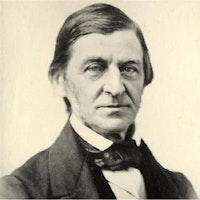Prayer is the contemplation of the facts of life from the highest point of view. It is the spirit of God pronouncing his works good.
Ralph Waldo Emerson

The Spirit of God
Topic: Prayer, Meditation, & Contemplation
Prayer that craves a particular commodity, anything less than all good, is vicious. Prayer is the contemplation of the facts of life from the highest point of view. It is the soliloquy of a beholding and jubilant soul. It is the spirit of God pronouncing his works good.
The Journey of a Visionary: Life, Teachings, and Legacy
Early Life
Ralph Waldo Emerson was born on May 25, 1803, in Boston, Massachusetts, into a family of Unitarian ministers. From an early age, he was exposed to the ideals of transcendentalism and the power of individual thought, which would later shape his philosophical outlook. After attending Harvard College, he began his career as a minister, but a crisis of faith led him to resign in 1832. This pivotal moment marked the beginning of his journey as a writer and thinker, as he traveled to Europe, where he met influential figures like Thomas Carlyle and William Wordsworth. These experiences ignited his passion for exploring the relationship between humanity and nature, setting the stage for his later contributions to literature and philosophy.
Teachings
Emerson is best known for his profound teachings on individualism, self-reliance, and the inherent goodness of people and nature. His seminal essays, such as "Nature" and "Self-Reliance," advocate for the importance of personal intuition and the rejection of societal conformity. He believed that true wisdom comes from within and that each person should trust their inner voice rather than rely on external authorities. Emerson’s ideas laid the groundwork for the transcendentalist movement, inspiring countless individuals to seek deeper connections with themselves and the world around them. His eloquent prose and insightful observations encouraged a spirit of self-discovery and social reform, influencing generations of thinkers, writers, and activists.
Death
Ralph Waldo Emerson passed away on April 27, 1882, in Concord, Massachusetts, leaving behind a rich legacy that continues to inspire. His writings and philosophical teachings have transcended time, influencing not only literature and philosophy but also social movements such as civil rights and environmentalism. Emerson’s belief in the power of the individual and the importance of personal integrity resonates with many today, reminding us of our potential to effect change in the world. As we reflect on his life, we are encouraged to embrace our unique voices, pursue our passions, and foster a deeper understanding of ourselves and the universe, ensuring that his visionary spirit lives on in our hearts and minds.
Emerson, Ralph Waldo. "Prayers." In Essays: Second Series, 1844.

Ralph Waldo Emerson
Theme: Prayer

Additional Ralph Waldo Emerson Quotes
Related Quotes
Copyright © 2017 – 2026 LuminaryQuotes.com About Us